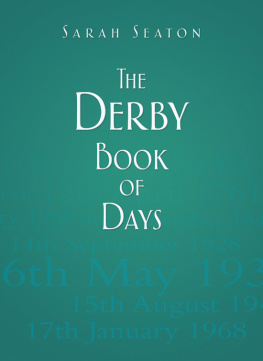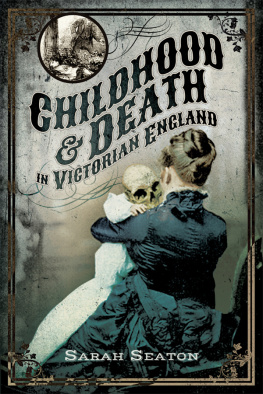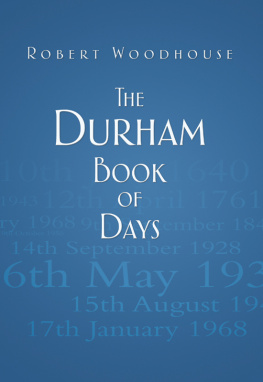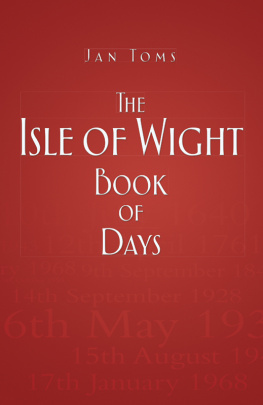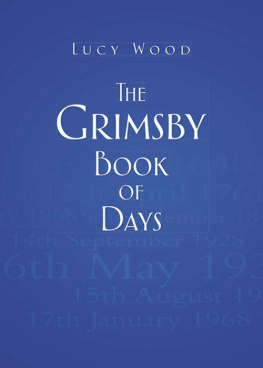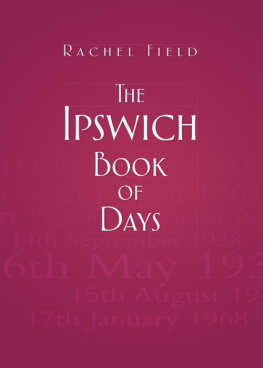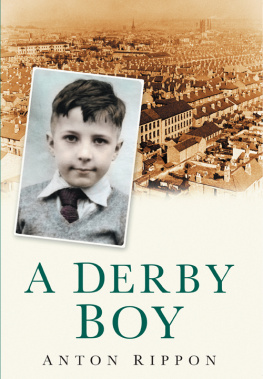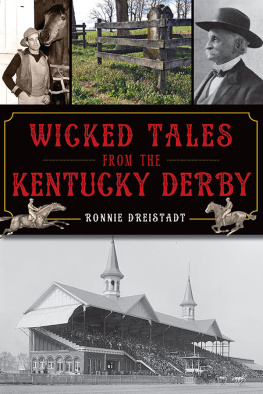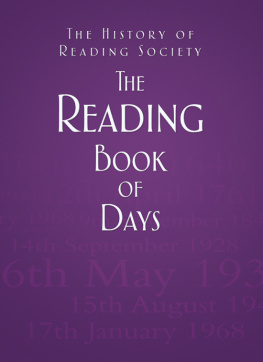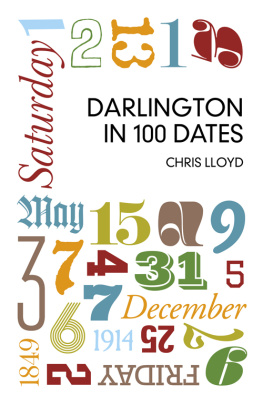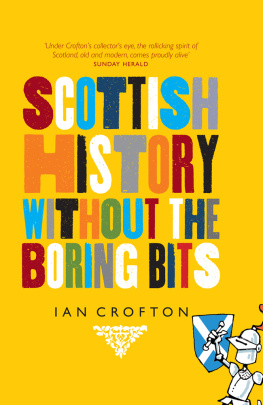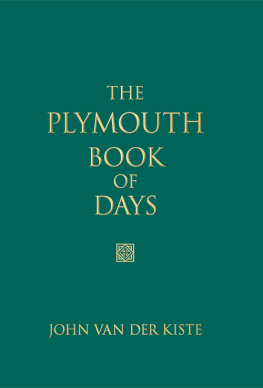THE
DERBY
BOOK
OF
DAYS
SARAH SEATON
For my children
and theirs
infinite
First published in 2013
The History Press
The Mill, Brimscombe Port
Stroud, Gloucestershire, GL5 2QG
www.thehistorypress.co.uk
This ebook edition first published in 2013
All rights reserved
Sarah Seaton, 2013
The right of Sarah Seaton to be identified as the Author of this work has been asserted in accordance with the Copyrights, Designs and Patents Act 1988.
This ebook is copyright material and must not be copied, reproduced, transferred, distributed, leased, licensed or publicly performed or used in any way except as specifically permitted in writing by the publishers, as allowed under the terms and conditions under which it was purchased or as strictly permitted by applicable copyright law. Any unauthorised distribution or use of this text may be a direct infringement of the authors and publishers rights, and those responsible may be liable in law accordingly.
EPUB ISBN 978 0 7509 5171 5
Original typesetting by The History Press
C ONTENTS
JANUARY 1ST
1756: On this day, William Duesbury, a china maker and founder of Royal Crown Derby, moved to the town. He had acquired a share in some pot works on Cockpit Hill, just outside Derby, which were owned and run by banker John Heath. After a brief partnership with Andrew Planche failed, Duesbury, with Heaths financial backing, started up a new, successful factory in Nottingham Road. Duesbury was described as a talented entrepreneur; he had created a new paste containing glass frit, soaprock and calcined bone, and he also hired the best talent available to model and paint his wares. The new porcelain allowed Duesbury to begin manufacturing luxury tableware, and his reputation for first-class dinnerware quickly grew. As a result, in April 1757, he employed the services of a London agent and took over the Chelsea pottery factory, moving into the London market.
In March 1775, Duesbury and Heath were given a Royal Warrant by George III, appointing them China Manufacturers in Ordinary to His Majesty. From this point on their Duesbury D was topped with a crown proof they were Derby China Manufacturers to His Majesty. When Heath became bankrupt in 1779 Duesbury became sole proprietor, and in 1784 all manufacturing became centralised in Derby. (www.wikipedia.org)
JANUARY 2ND
1884: On this day, the Derby Mercury gave its readers a free almanac for the coming year. It featured an alphabetical list of borough and county magistrates, Councillors of the Borough of Derby, and committees within the borough, stating that the Mayor was ex officio a member of all committees. Borough officers, such as the coroner, inspectors of gas meters, petroleum and hackney carriages, were named, as well as others such as the sanitary inspector, examiner of canal boats, medical officer of health, and police surgeon. Ten banks were recorded in the town, including the Penny Bank on Full Street, and Derby Commercial Bank Limited on St Peters Bridge. A full list of trustees and staff were given for the Derbyshire General Infirmary as well as its visiting hours, which were Tuesdays and Fridays from 10 a.m. until 12 noon, and 2 p.m. until 4 p.m. The Derby Post Office, situated on Victoria Street and St James Street, gave details of the districts that letters could be posted to, and at what times, and the post boxes were also listed street by street with collection times. Members of the Poor Law Union, Mechanics Institute and Derby School Board were listed, amongst others. (Derby Mercury)
JANUARY 3RD
1899: On this day, builder William Eaton and draper and warehouseman J. Hitchens entered into a contract to erect numbers 2 and 3 St Peters Street, Derby. Hitchens employed architect Arthur Eaton (not related) to draw up plans of the buildings, and William Eaton to build the properties according to the plans and specifications of the architect. The project had to be completed by March 18th of the same year, otherwise they would be subjected to a penalty clause whereby William Eaton would have to pay 10 a week for the delay. The building was not completed until October 2nd, a period of twenty-eight weeks, which caused Hitchens a great amount of loss and inconvenience. Hitchens and Eaton were in dispute over the matter, and Arthur Eaton acted as arbitrator between the two parties. The issue was taken to the Queens Bench Division on Wednesday, November 7th 1900 before the Lord Chief Justice and Mr Justice Kennedy, sitting as a Divisional Court. Hitchen requested that Arthur Eaton be removed as arbitrator, as he had acted in favour of the builder the court denied his request. (Derby Mercury)
JANUARY 4TH
1870: On this day, Thomas Williamson, a thirty-six-year-old engine driver, stole a wheelbarrow belonging to John Parker, a broker from Siddals Road. Parker had attended a sale in Upper Brook Street on January 4th when the wheelbarrow went missing he valued it at 13s or 14s and notified the police straightaway. Williamson was taken before the Derby Borough Quarter Sessions on April 7th 1870, in front of George Boden QC. Mr C.F. Roe stood for the prosecution and the prisoner was undefended. Parker claimed he met Williamson in the Morledge on January 21st and that Williamson had the wheelbarrow with him. Parker told him that it was his wheelbarrow but Williamson claimed he had bought it. A statement by Harriet Wigley, with whom Williamson had lodged with for the last five years, did Williamson no favours. When interviewed, Harriet stated that Williamson had turned up with the wheelbarrow a week or fortnight before he was taken into custody and had told her that he had got it instead of payment for a days work at a sale. However, he later told her he had bought it. Consequently, the jury found him guilty and he was sentenced to three months with hard labour. (Derby Mercury)
JANUARY 5TH
1915: On this day, an order titled Defence of the Realm (Consolidation) Act, 1914 Closing Order, was made and signed in Derby by Major J.A. Reeks. The Act was introduced to regulate pub opening hours during the Great War and stipulated that:
All licensed premises for the sale of intoxicating liquor within the areas specified in the schedule shall be closed for the sale of intoxicating liquor to any persons not resident therein at 9 p.m., and shall also be closed as respects the members of His Majestys forces except during the hours between 12 noon and 1 p.m. and the hours between 6 p.m. and 9 p.m.
The Act covered a three-mile radius around Derby market place, and included the same radius around Chesterfield, Baslow, Buxton, the Hayes, Swanwick, Nottingham, Newark-on-Trent, and Retford. The order was criticised in the trade, as landlords were already paying higher taxes and the same law did not extend to private clubs. The war had badly affected trade and it was feared that many men would lose jobs because of it. (Mansfield Reporter; Sutton-in-Ashfield Times)
JANUARY 6TH
2012: On this day, the Derby Telegraph reported on high winds and how they had caused a debate over a fallen chimney pot. Jason Ryalls chimney had fallen off his roof at 5.30 a.m. the previous morning, but when he tried to make a claim he was told by the insurance company Legal & General that they would only accept storm force winds of over 45mph and, according to their records, the winds in Derby had not reached that figure. However, the winds in the East Midlands were confirmed by the Met Office to be gale force, reaching up to 54mph. The Derby Telegraph contacted Legal & General on behalf of Jason about this and they admitted their error, claiming that their records had since been updated to show a higher rate of wind; they agreed to pay for the damage. The wind, combined with heavy rain, caused disruption throughout the area, with falling trees causing problems on the roads. The weather also caused power cuts and flooding throughout the county, with the council and fire brigade staff having to work throughout the day at various incidents. Flood alerts were issued by the Environment Agency for parts of the River Trent, River Dove and River Derwent. (
Next page
